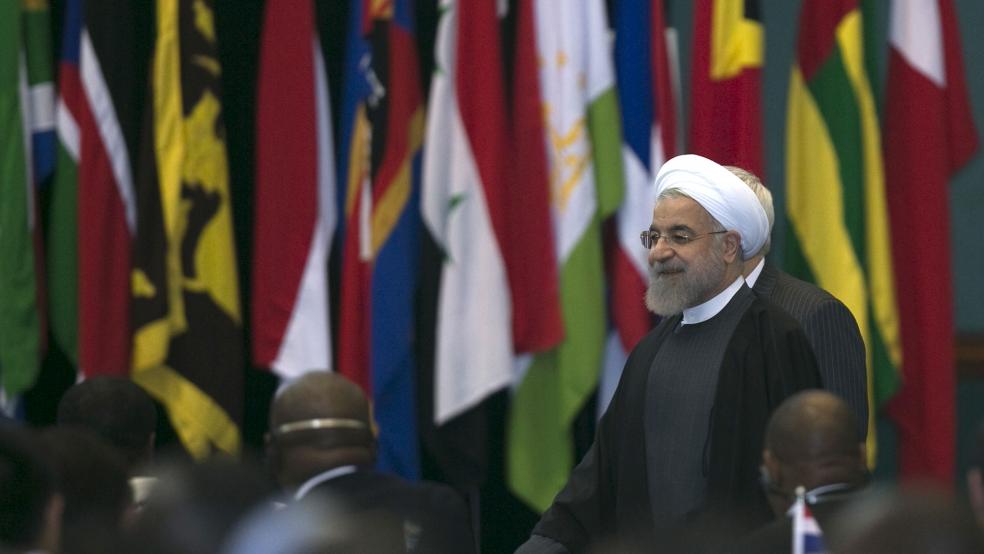As Secretary of State John F. Kerry hobbles off to Vienna on crutches this weekend for a final round of talks with Iran over a pact to prevent Tehran from developing a nuclear weapon, the administration is coming under growing pressure to pull back from the deal.
With a June 30 deadline looming for a final agreement requiring Iran to shelve development of a nuclear weapon for more than a decade in return for the U.S. and other nations lifting economic sanctions against it, the negotiators are close to an historic agreement.
Related: Iran’s Arrogance Complicates Prospects for a Nuclear Deal
"Some major problems exist which are still blocking the work,” Iran’s deputy foreign minister reportedly said Friday, “but in other areas we have made good progress."
Yet many Democratic and Republican lawmakers insist that — even if a final agreement somehow emerges and withstands congressional scrutiny — Iranian leaders cannot be trusted to keep their end of the bargain. Sens. Robert Menendez (D-N.J.) and Mark Kirk (R-Ill.) are among politicians so eager to scuttle the talks that they recently proposed legislation that would extend by 10 years a 1996 Iran sanctions law that includes nuclear-related provisions.
President Obama and Kerry, who is recovering from a broken leg suffered in a bicycle accident, argue that a negotiated agreement with Tehran and other countries is the best way to prevent a nuclear build-up in the Middle East and military conflict between Israel and Iran. But the administration has made numerous concessions since the nuclear talks first began two years ago. And even experts highly sympathetic to Obama’s efforts warn that Obama may be too eager to reach a final accord.
Most notably, five former members of the president’s inner circle of Iran advisers wrote an open letter this week expressing concern that the final agreement may fall short of meeting Obama’s own expressed standard of a good agreement. And they spelled out what they view as minimum requirements that Iran must agree to in the coming days in order for them to support it.
“Most of us would have preferred a stronger agreement,” the letter said. “The agreement will not prevent Iran from having a nuclear weapons capability.... It will not require the dismantling of Iran’s nuclear enrichment infrastructure. It will however reduce that infrastructure for the next 10 to 15 years. And it will impose a transparency, inspection, and consequences regime with the goal of deterring and dissuading Iran from actually building a nuclear weapon.”
Related: Former Obama Aides Say U.S. Needs Tougher Iran Nuclear Deal
Among the authors of the letter: Dennis B. Ross, who supervised White House Iran policy during Obama’s first term; David H. Petraeus, the former C.I.A. director; Robert Einhorn, a former State Department expert on nuclear proliferation who helped devise sanctions against Iran; Gary Samore, Obama’s former chief adviser on nuclear policy; and Gen. James E. Cartwright, a former vice chairman of the Joint Chiefs of Staff.
The biggest cause for alarm, for sure, was the inflammatory speech this week by Iran’s Supreme Leader, Ayatollah Ali Khamenei, drawing a number of red lines for the final round of negotiations that seriously undercut key elements of the tentative agreement reached in Switzerland April 2. In a televised speech, Khamenei insisted that the sanctions against his country be lifted before Iran starts to dismantle its nuclear infrastructure or allows inspections of nuclear and military sites. The Supreme Leader also backpedaled on a preliminary commitment to freeze Iran’s nuclear enrichment program for 10 years.
In short, he was verbally gutting the heart of the tentative agreement that his foreign minister, Mohammad Javad Zarif, had painstakingly hammered out with Kerry and other international leaders. Moreover, Khamenei will have more to say about whether to accept or reject a final agreement than any other leader in Iran. So whether or not he is bluffing, the Obama administration must be mindful that Iran can’t be counted on to live up to the terms of any deal that finally emerges — even if they can get the deal in writing.
Related: Obama Turns to Corker to Sell His Iranian Nuke Deal
There’s a growing consensus in Washington among politicians, think tank experts and pundits that no deal may be a lot better in the long run than a badly compromised agreement with a country whose leadership is divided and renowned for its ruthlessness and unpredictability.
And just as a reminder of who the U.S. is bargaining with, the State Department yesterday issued its latest assessment of Iran’s sorry record on human rights, noting that the government has “stifled dissent; arrested students, journalists and lawyers; and engaged in unlawful killings.”
Related: Senate OKs Oversight of Iran Nuke Deal
One of those journalists is the Washington Post’s 39-year-old Tehran bureau chief, Jason Rezaian, who has been held in unspeakable prison conditions for the better part of a year on trumped up espionage charges.
“I can’t say that we have seen any meaningful improvement in the human rights situation in Iran,” Tom Malinowski, the assistant secretary of state for human rights, told reporters yesterday.
Top Reads From The Fiscal Times:





